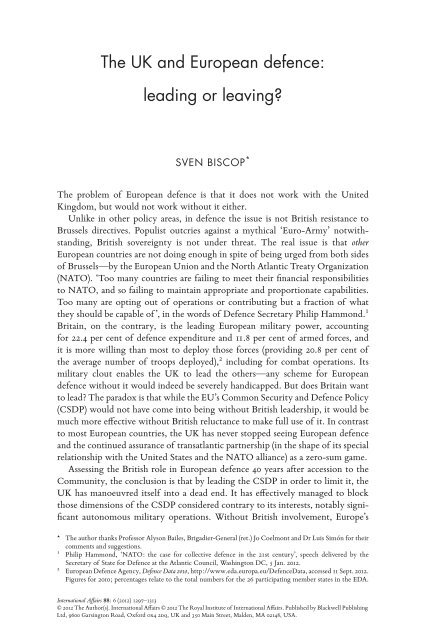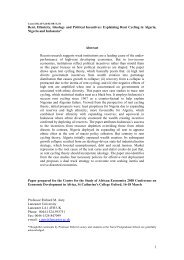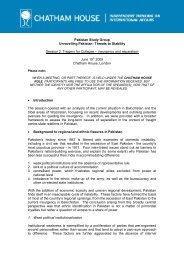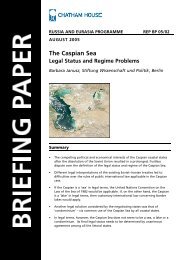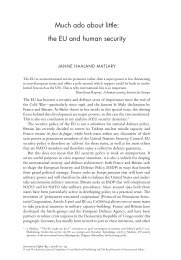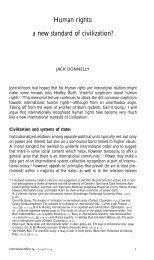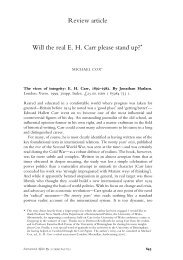The UK and European defence: leading or leaving? - Chatham House
The UK and European defence: leading or leaving? - Chatham House
The UK and European defence: leading or leaving? - Chatham House
You also want an ePaper? Increase the reach of your titles
YUMPU automatically turns print PDFs into web optimized ePapers that Google loves.
<strong>The</strong> <strong>UK</strong> <strong>and</strong> <strong>European</strong> <strong>defence</strong>:<br />
<strong>leading</strong> <strong>or</strong> <strong>leaving</strong>?<br />
SVEN BISCOP *<br />
<strong>The</strong> problem of <strong>European</strong> <strong>defence</strong> is that it does not w<strong>or</strong>k with the United<br />
Kingdom, but would not w<strong>or</strong>k without it either.<br />
Unlike in other policy areas, in <strong>defence</strong> the issue is not British resistance to<br />
Brussels directives. Populist outcries against a mythical ‘Euro-Army’ notwithst<strong>and</strong>ing,<br />
British sovereignty is not under threat. <strong>The</strong> real issue is that other<br />
<strong>European</strong> countries are not doing enough in spite of being urged from both sides<br />
of Brussels—by the <strong>European</strong> Union <strong>and</strong> the N<strong>or</strong>th Atlantic Treaty Organization<br />
(NATO). ‘Too many countries are failing to meet their financial responsibilities<br />
to NATO, <strong>and</strong> so failing to maintain appropriate <strong>and</strong> prop<strong>or</strong>tionate capabilities.<br />
Too many are opting out of operations <strong>or</strong> contributing but a fraction of what<br />
they should be capable of ’, in the w<strong>or</strong>ds of Defence Secretary Philip Hammond. 1<br />
Britain, on the contrary, is the <strong>leading</strong> <strong>European</strong> military power, accounting<br />
f<strong>or</strong> 22.4 per cent of <strong>defence</strong> expenditure <strong>and</strong> 11.8 per cent of armed f<strong>or</strong>ces, <strong>and</strong><br />
it is m<strong>or</strong>e willing than most to deploy those f<strong>or</strong>ces (providing 20.8 per cent of<br />
the average number of troops deployed), 2 including f<strong>or</strong> combat operations. Its<br />
military clout enables the <strong>UK</strong> to lead the others—any scheme f<strong>or</strong> <strong>European</strong><br />
<strong>defence</strong> without it would indeed be severely h<strong>and</strong>icapped. But does Britain want<br />
to lead? <strong>The</strong> paradox is that while the EU’s Common Security <strong>and</strong> Defence Policy<br />
(CSDP) would not have come into being without British leadership, it would be<br />
much m<strong>or</strong>e effective without British reluctance to make full use of it. In contrast<br />
to most <strong>European</strong> countries, the <strong>UK</strong> has never stopped seeing <strong>European</strong> <strong>defence</strong><br />
<strong>and</strong> the continued assurance of transatlantic partnership (in the shape of its special<br />
relationship with the United States <strong>and</strong> the NATO alliance) as a zero-sum game.<br />
Assessing the British role in <strong>European</strong> <strong>defence</strong> 40 years after accession to the<br />
Community, the conclusion is that by <strong>leading</strong> the CSDP in <strong>or</strong>der to limit it, the<br />
<strong>UK</strong> has manoeuvred itself into a dead end. It has effectively managed to block<br />
those dimensions of the CSDP considered contrary to its interests, notably significant<br />
autonomous military operations. Without British involvement, Europe’s<br />
* <strong>The</strong> auth<strong>or</strong> thanks Profess<strong>or</strong> Alyson Bailes, Brigadier-General (ret.) Jo Coelmont <strong>and</strong> Dr Luis Simón f<strong>or</strong> their<br />
comments <strong>and</strong> suggestions.<br />
1 Philip Hammond, ‘NATO: the case f<strong>or</strong> collective <strong>defence</strong> in the 21st century’, speech delivered by the<br />
Secretary of State f<strong>or</strong> Defence at the Atlantic Council, Washington DC, 5 Jan. 2012.<br />
2 <strong>European</strong> Defence Agency, Defence Data 2010, http://www.eda.europa.eu/DefenceData, accessed 11 Sept. 2012.<br />
Figures f<strong>or</strong> 2010; percentages relate to the total numbers f<strong>or</strong> the 26 participating member states in the EDA.<br />
International Affairs 88: 6 (2012) 1297–1313<br />
© 2012 <strong>The</strong> Auth<strong>or</strong>(s). International Affairs © 2012 <strong>The</strong> Royal Institute of International Affairs. Published by Blackwell Publishing<br />
Ltd, 9600 Garsington Road, Oxf<strong>or</strong>d ox4 2dq, <strong>UK</strong> <strong>and</strong> 350 Main Street, Malden, MA 02148, USA.
Sven Biscop<br />
potential to deploy where Britain does not want it to is limited; but so is its<br />
potential to deliver capabilities that are in the British interest. NATO has been<br />
equally unsuccessful in beefing up <strong>European</strong> capabilities. <strong>The</strong> <strong>UK</strong> finds itself back<br />
in its starting position, facing a fragmented <strong>European</strong> <strong>defence</strong> eff<strong>or</strong>t with limited<br />
deployable capabilities—but with one crucial difference. As the United States’<br />
strategic focus is shifting away from Europe to the Asia–Pacific region, the <strong>UK</strong> is<br />
much m<strong>or</strong>e dependent on its <strong>European</strong> allies. M<strong>or</strong>e than ever, it is in the British<br />
interest to take a <strong>leading</strong> role in <strong>European</strong> <strong>defence</strong>. This article will show how,<br />
in this new context, the CSDP can function militarily as the <strong>European</strong> pillar of<br />
NATO, under the political guidance of the EU—but only if Britain (along with<br />
France) provides strong leadership.<br />
Subcontracting <strong>European</strong> <strong>defence</strong><br />
In 1973 <strong>defence</strong> played little <strong>or</strong> no part in Britain’s accession to the <strong>European</strong><br />
Economic Community (EEC). <strong>The</strong> existing member states had only just taken<br />
their first tentative steps in f<strong>or</strong>eign policy, through <strong>European</strong> Political Cooperation<br />
(EPC), a political mechanism created alongside the f<strong>or</strong>mal Community institutions,<br />
which would gather momentum only after Britain joined, dealing with the<br />
political fallout of the Yom Kippur War <strong>and</strong> the subsequent oil crisis. In <strong>defence</strong><br />
the EEC simply was not an act<strong>or</strong>—not because its members had opted f<strong>or</strong> ‘civilian<br />
power’, but because after the failed attempt to create a supranational <strong>European</strong><br />
Defence Community in 1954 they had decided to <strong>or</strong>ganize their common <strong>defence</strong><br />
eff<strong>or</strong>t in another institution: NATO. <strong>The</strong> <strong>UK</strong>, France <strong>and</strong> the Benelux countries<br />
did create the Western <strong>European</strong> Union (WEU) in 1954, inc<strong>or</strong>p<strong>or</strong>ating Germany<br />
<strong>and</strong> Italy into their 1948 Western Union. But the WEU, if not perhaps a beauty,<br />
was certainly sleeping, having abdicated all of its executive tasks in favour of<br />
NATO <strong>and</strong> the EEC. F<strong>or</strong> the founding fathers, <strong>European</strong> integration as such was<br />
of course a peace project, crucial to Franco-German reconciliation. But while<br />
the <strong>UK</strong> welcomed this idea of <strong>European</strong> integration, with a view to the peace<br />
<strong>and</strong> stability of continental Europe, its eventual accession was mostly driven by<br />
economic considerations.<br />
Only in the 1980s did <strong>European</strong>s begin to imagine <strong>European</strong> <strong>defence</strong> outside<br />
(but still closely connected to) NATO. As EPC developed, security issues naturally<br />
found their way onto its agenda, f<strong>or</strong> example in the context of the Conference<br />
on Security <strong>and</strong> Co-operation in Europe, where the EEC as such was represented.<br />
In June 1990, impelled by the need to deal with the geopolitical turning-point of<br />
the end of the Cold War, the decision was made to <strong>or</strong>ganize an intergovernmental<br />
conference (IGC) on political union, including f<strong>or</strong>eign <strong>and</strong> security policy. As if to<br />
underline the urgency, in the course of the IGC both the Gulf War <strong>and</strong> the civil<br />
war in the f<strong>or</strong>mer Yugoslavia demonstrated the powerlessness of <strong>European</strong>s in the<br />
absence of firm f<strong>or</strong>eign <strong>and</strong> security policy structures. Some member states were<br />
further motivated to expl<strong>or</strong>e a m<strong>or</strong>e autonomous <strong>European</strong> <strong>defence</strong> by a growing<br />
awareness that <strong>European</strong> <strong>and</strong> American interests, pri<strong>or</strong>ities <strong>and</strong> approaches do not<br />
1298<br />
International Affairs 88: 6, 2012<br />
Copyright © 2012 <strong>The</strong> Auth<strong>or</strong>(s). International Affairs © 2012 <strong>The</strong> Royal Institute of International Affairs.
<strong>The</strong> <strong>UK</strong> <strong>and</strong> <strong>European</strong> <strong>defence</strong><br />
always coincide. At the same time it became clear that in the post-Cold War era<br />
the United States could not automatically be counted upon to solve <strong>European</strong><br />
security problems. <strong>The</strong> United Kingdom, under a Conservative government<br />
throughout this period, became convinced that <strong>European</strong>s would have to <strong>or</strong>ganize<br />
themselves to shoulder a larger share of the <strong>defence</strong> burden <strong>and</strong> demonstrate their<br />
own commitment in <strong>or</strong>der to ensure a continued commitment on the part of the<br />
United States.<br />
Conflicting objectives were thus not only present from the start, but actually<br />
enabled <strong>European</strong> <strong>defence</strong>. <strong>The</strong> chosen vehicle was the WEU. 3 As an existing<br />
<strong>European</strong> <strong>or</strong>ganization separate from the EEC <strong>and</strong> closely tied to NATO, it was<br />
acceptable to all. Starting with the 1984 Rome Declaration, the political bodies<br />
of the WEU were brought back to life. <strong>The</strong> 1987 Hague Platf<strong>or</strong>m on <strong>European</strong><br />
Security Interests stated its dual mission: a strong commitment both to <strong>European</strong><br />
union, as set out in the 1986 Single <strong>European</strong> Act, <strong>and</strong> to NATO, stressing the<br />
indivisibility of Atlantic security. Embryonic operational structures were created,<br />
<strong>and</strong> 1988 saw the first <strong>European</strong> military operation, Operation Cleansweep in the<br />
Persian Gulf, followed by further maritime operations during the Gulf War <strong>and</strong><br />
the wars in the f<strong>or</strong>mer Yugoslavia. It should be noted, though, that in October<br />
1991 the only really significant operation proposed, to deploy tens of thous<strong>and</strong>s of<br />
troops to Croatia to halt the fighting <strong>and</strong> prevent it spilling over into Bosnia <strong>and</strong><br />
Herzegovina, was vetoed by the <strong>UK</strong>, the Netherl<strong>and</strong>s <strong>and</strong> P<strong>or</strong>tugal.<br />
In 1993 this process culminated in the Maastricht Treaty, which created the<br />
EU <strong>and</strong> transf<strong>or</strong>med EPC into the Common F<strong>or</strong>eign <strong>and</strong> Security Policy (CFSP).<br />
<strong>The</strong> WEU was written into the Treaty on <strong>European</strong> Union (TEU) as the default<br />
subcontract<strong>or</strong> f<strong>or</strong> any military operations which the EU members would want<br />
to undertake. Simultaneously, at its November 1991 Rome summit, NATO<br />
welcomed the development of a <strong>European</strong> Security <strong>and</strong> Defence Identity (ESDI)<br />
within the alliance, through the WEU, emphasizing again the indivisibility of<br />
Atlantic security, to satisfy British <strong>and</strong> American concerns.<br />
Taking out the middleman<br />
<strong>The</strong> Maastricht arrangement was strengthened by the 1997 Amsterdam Treaty,<br />
which de facto sub<strong>or</strong>dinated the WEU to the EU (though the ambitious proposal<br />
to abolish the WEU <strong>and</strong> transfer its competences to the EU was vetoed by five<br />
members, including the <strong>UK</strong>). <strong>The</strong> 1992 Petersberg Declaration had identified the<br />
types of operations which the WEU could undertake: basically all, including<br />
combat, from evacuation <strong>and</strong> humanitarian supp<strong>or</strong>t to peacekeeping <strong>and</strong> peace<br />
enf<strong>or</strong>cement. <strong>The</strong>se ‘Petersberg Tasks’ were now included in the TEU. <strong>The</strong> WEU<br />
set up a Military Committee, a Planning Cell, a Situation Centre <strong>and</strong> a Satellite<br />
Centre, <strong>and</strong> created a catalogue of F<strong>or</strong>ces Answerable to the WEU (FAWEU),<br />
which members could make available f<strong>or</strong> operations on a case-by-case basis.<br />
3 Alyson Bailes <strong>and</strong> Graham Messervy-Whiting, Death of an institution: the end f<strong>or</strong> Western <strong>European</strong> Union, a future<br />
f<strong>or</strong> <strong>European</strong> <strong>defence</strong>?, Egmont Paper no. 46 (Brussels: Egmont Institute, 2011).<br />
International Affairs 88: 6, 2012<br />
Copyright © 2012 <strong>The</strong> Auth<strong>or</strong>(s). International Affairs © 2012 <strong>The</strong> Royal Institute of International Affairs.<br />
1299
Sven Biscop<br />
This elab<strong>or</strong>ate system was put to use just twice, f<strong>or</strong> operations of a limited<br />
scope: a police operation in the Bosnian city of Mostar (1994–6) <strong>and</strong> a de-mining<br />
assistance mission in Croatia (1999–2000). In 1996 the WEU agreed to supp<strong>or</strong>t a<br />
UN-m<strong>and</strong>ated f<strong>or</strong>ce which was to protect the hundreds of thous<strong>and</strong>s of Hutu<br />
refugees from the Rw<strong>and</strong>an conflict in eastern Congo, who were now threatened<br />
by a military rebellion against President Mobutu but prevented from returning<br />
home by elements of the f<strong>or</strong>mer Rw<strong>and</strong>an regime mixed among them. As the<br />
new Rw<strong>and</strong>an government refused any f<strong>or</strong>ce access to its territ<strong>or</strong>y <strong>and</strong> the greater<br />
part of the refugees eventually did make it home, the need <strong>and</strong> the will to intervene<br />
evap<strong>or</strong>ated <strong>and</strong> the Security Council ended the m<strong>and</strong>ate bef<strong>or</strong>e the operation<br />
had been launched. In 1997, the EU/WEU missed the opp<strong>or</strong>tunity to take charge<br />
of crisis management in Albania; the <strong>UK</strong> <strong>and</strong> Germany in particular rejected<br />
intervention. In this crisis on its do<strong>or</strong>step, in which the US declined to become<br />
involved, the EU/WEU could have taken the lead. Eventually, an ad hoc Italianled<br />
coalition mounted Operation Alba. In 1998–9 the WEU, at the EU’s request,<br />
put its Satellite Centre to use to obtain data on Kosovo but was not substantially<br />
involved in military crisis management there; this was undertaken by NATO as a<br />
logical continuance of its US-led military role in the Balkans.<br />
<strong>The</strong> lack of collective will to make use of the WEU reflected the contra dict<strong>or</strong>y<br />
motivations of its members. France <strong>and</strong> Belgium attached pri<strong>or</strong>ity to developing<br />
specific <strong>European</strong> strategies, to be implemented when necessary through autonomous<br />
operations. F<strong>or</strong> the <strong>UK</strong>, the key function of the WEU was to stimulate an<br />
enhanced <strong>European</strong> eff<strong>or</strong>t in supp<strong>or</strong>t of NATO. <strong>The</strong> net result was that neither<br />
objective was achieved. At this point, the EU had not adopted any strategic<br />
document <strong>and</strong> thus operated on an implicit gr<strong>and</strong> strategy at best. This reflected<br />
the <strong>or</strong>ientations that had emerged under EPC <strong>and</strong> were gaining substance through<br />
the CFSP: an emphasis on conflict prevention; a holistic approach linking trade<br />
<strong>and</strong> development with f<strong>or</strong>eign policy <strong>and</strong>, increasingly, security; dialogue <strong>and</strong><br />
partnership with other states <strong>and</strong> multilateral <strong>or</strong>ganizations. <strong>The</strong> EU/WEU did<br />
not have an explicit view of its pri<strong>or</strong>ity responsibilities in terms of regions <strong>and</strong><br />
types of crises. In the absence of a consensus on the operations in which <strong>European</strong>s<br />
were willing to engage, the debate about the respective roles of NATO <strong>and</strong> the<br />
EU/WEU could not be resolved.<br />
N<strong>or</strong>, theref<strong>or</strong>e, could there be any consensus on the level of ambition in terms<br />
of military capabilities. This was the time when <strong>European</strong>s were cashing in the<br />
peace dividend <strong>and</strong> drastically reducing <strong>defence</strong> spending. Politically inevitable<br />
<strong>and</strong> principally right (with the disappearance of a vital threat to <strong>European</strong> territ<strong>or</strong>y,<br />
needs in other policy areas took precedence), successive <strong>defence</strong> cuts resulting in<br />
successive unfinished ref<strong>or</strong>m plans left many armed f<strong>or</strong>ces in disarray. <strong>The</strong> transf<strong>or</strong>mation<br />
from territ<strong>or</strong>ial <strong>defence</strong> (the function assigned by the United States<br />
<strong>and</strong> Soviet Union to their respective allies during the Cold War) to expeditionary<br />
operations (required to perf<strong>or</strong>m the Petersberg Tasks) was delayed. At the end of<br />
the decade Europe still could boast at most 10 per cent of deployable f<strong>or</strong>ces. 4<br />
4<br />
Gab<strong>or</strong> H<strong>or</strong>vath, ‘CSDP military ambitions <strong>and</strong> potentials: do we know what we have?’, Studia Diplomatica 64:<br />
1, 2011, pp. 55– 60.<br />
1300<br />
International Affairs 88: 6, 2012<br />
Copyright © 2012 <strong>The</strong> Auth<strong>or</strong>(s). International Affairs © 2012 <strong>The</strong> Royal Institute of International Affairs.
<strong>The</strong> <strong>UK</strong> <strong>and</strong> <strong>European</strong> <strong>defence</strong><br />
It was this s<strong>or</strong>ry state of affairs that prompted an unexpected change of course<br />
by the <strong>UK</strong>, now under a Labour government led by Tony Blair. First announced<br />
by Blair at an inf<strong>or</strong>mal EU summit in Pörtschach in Austria on 24–25 October 1998<br />
<strong>and</strong> reiterated by Defence Secretary Ge<strong>or</strong>ge Robertson at the first inf<strong>or</strong>mal meeting<br />
of EU <strong>defence</strong> ministers in Vienna on 4 November, it led to a Franco-British<br />
declaration (at St-Malo on 4 December) that heralded a new phase in <strong>European</strong><br />
<strong>defence</strong>. Britain <strong>and</strong> France called f<strong>or</strong> a capacity f<strong>or</strong> autonomous <strong>European</strong> action<br />
within the institutional framew<strong>or</strong>k of the EU, including ‘appropriate structures<br />
f<strong>or</strong> analysis of situations, intelligence <strong>and</strong> strategic planning’, while respecting<br />
obligations to, <strong>and</strong> avoiding duplication with, NATO.<br />
<strong>The</strong> reasons f<strong>or</strong> this change of course were mostly pragmatic. 5 <strong>The</strong> main British<br />
concern remained the viability of NATO <strong>and</strong> the continued involvement of the<br />
United States in the <strong>defence</strong> of Europe. <strong>The</strong> 1999 Kosovo campaign would put<br />
the spotlight on Europe’s sh<strong>or</strong>tfalls. <strong>European</strong>s were actually m<strong>or</strong>e willing than<br />
the US to commit ground f<strong>or</strong>ces at an early stage, but then experienced great<br />
difficulties putting 50,000 troops into the field, in spite of their impressive overall<br />
numbers of unif<strong>or</strong>med personnel. London sensed that others could be m<strong>or</strong>e<br />
readily persuaded to step up capability development under the EU flag. In British<br />
eyes, the main criterion by which any EU scheme would be judged was the ability<br />
to produce capabilities rather than to conduct autonomous operations. F<strong>or</strong> policymaking<br />
<strong>and</strong> operations, the <strong>UK</strong> continued to think primarily in terms of NATO,<br />
emphasizing the ESDI <strong>and</strong> the mechanism of Combined Joint Task F<strong>or</strong>ces (CJTF)<br />
within which NATO comm<strong>and</strong> <strong>and</strong> control could be used f<strong>or</strong> <strong>European</strong> operations.<br />
This remains the position today, as David Lidington, Minister of State f<strong>or</strong><br />
Europe, asserted in June 2012: ‘First <strong>and</strong> f<strong>or</strong>emost, NATO remains the bedrock<br />
of Britain’s national security.’ While this ‘unbending supp<strong>or</strong>t f<strong>or</strong> NATO’ is not<br />
considered inconsistent with the value placed on ‘other <strong>European</strong> tools’, the EU’s<br />
role is deemed ‘complementary’ to NATO, ‘the best tool f<strong>or</strong> Europe to respond to<br />
high intensity conflict situations’. 6 At the same time, in 1998 this was also a way of<br />
pressing f<strong>or</strong> ref<strong>or</strong>m within NATO (<strong>and</strong> perhaps partly a means of venting irritation<br />
with US blundering during the Kosovo campaign, f<strong>or</strong> example in bombing the<br />
Chinese embassy in Belgrade).<br />
A m<strong>or</strong>e political reason f<strong>or</strong> the move was that by taking the initiative on<br />
<strong>European</strong> <strong>defence</strong>, a debate which was bound to re-emerge anyway, the <strong>UK</strong> was<br />
able simultaneously to play a leadership role <strong>and</strong> to steer the outcome closer to<br />
its traditional transatlantic course. Significantly, thanks to this proactive stance<br />
the <strong>UK</strong> was able to join f<strong>or</strong>ces with France (under President Jacques Chirac),<br />
traditionally—despite the two countries’ shared global outlook—its opponent<br />
on <strong>defence</strong> issues. Thus a Franco-British axis emerged in addition to the Franco-<br />
German economic <strong>and</strong> financial axis. In fact, at this point Germany too, under<br />
5 Sven Biscop, ‘<strong>The</strong> <strong>UK</strong>’s change of course: a new chance f<strong>or</strong> the ESDI’, <strong>European</strong> F<strong>or</strong>eign Affairs Review 4: 2,<br />
1999, pp. 253–68; John Roper, ‘Two cheers f<strong>or</strong> Tony Blair? <strong>The</strong> political realities of <strong>European</strong> <strong>defence</strong> cooperation’,<br />
in Geoffrey Edwards <strong>and</strong> Ge<strong>or</strong>ge Wiessala, eds, <strong>The</strong> <strong>European</strong> Union: the Annual Review 1999–2000<br />
(Chichester: Wiley-Blackwell, 2001), pp. 7–23.<br />
6 David Lidington, ‘EU Common Security <strong>and</strong> Defence Policy: the <strong>UK</strong> perspective’, speech delivered by the<br />
Minister of State f<strong>or</strong> Europe in Paris, 27 June 2012.<br />
International Affairs 88: 6, 2012<br />
Copyright © 2012 <strong>The</strong> Auth<strong>or</strong>(s). International Affairs © 2012 <strong>The</strong> Royal Institute of International Affairs.<br />
1301
Sven Biscop<br />
Chancell<strong>or</strong> Gerhard Schröder <strong>and</strong> F<strong>or</strong>eign Minister Joschka Fischer, was pursuing<br />
a m<strong>or</strong>e voluntarist f<strong>or</strong>eign <strong>and</strong> security policy, so the constellation was extremely<br />
positive. This strong dynamic resulted in the creation in 1999 of the <strong>European</strong><br />
Security <strong>and</strong> Defence Policy (ESDP) within the EU, as the civilian–military<br />
operational arm of the CFSP. <strong>The</strong> 2001 Treaty of Nice gave it a legal basis in the<br />
TEU <strong>and</strong> ended the ‘contract’ with the WEU, which would in 2011 lead to the<br />
end of the WEU as such, at the initiative of the <strong>UK</strong>.<br />
ESDP: too much <strong>or</strong> too little?<br />
<strong>The</strong> first years of the ESDP saw a flurry of activity, in which the ‘big three’<br />
continued to play the <strong>leading</strong> roles. <strong>The</strong> internal division within the EU about the<br />
US invasion of Iraq in 2003 did not block this dynamic—indeed, it even contributed<br />
to it in respect of the adoption of the <strong>European</strong> Security Strategy (ESS) in<br />
2003. <strong>The</strong> ESS resulted from the converging motivations of those in supp<strong>or</strong>t of <strong>and</strong><br />
those against the invasion, seeking to signal respectively that Europe cared about<br />
the same threats as the US, but did not necessarily address them in the same way.<br />
<strong>The</strong> same year of 2003 also saw the first autonomous ESDP operation, without<br />
the use of NATO assets, in the Democratic Republic of the Congo: Operation<br />
Artemis. Its f<strong>or</strong>mat inspired the Battlegroup concept, a Franco-British initiative,<br />
to which Germany adhered, to provide the EU with two battalion-sized rapid<br />
response f<strong>or</strong>ces on st<strong>and</strong>by. In 2004 the <strong>European</strong> Defence Agency (EDA) was set<br />
up to stimulate joint capability development, procurement, research <strong>and</strong> market<br />
integration.<br />
An intricate capability development mechanism was created to achieve the 1999<br />
Helsinki Headline Goal of 60,000 troops deployable within 60 days <strong>and</strong> sustainable<br />
f<strong>or</strong> at least one year. At the strategic level, starting from the ESS <strong>and</strong> how<br />
the EU sees its role in the w<strong>or</strong>ld, the <strong>European</strong> Council decides what the EU<br />
wants to be capable of doing, <strong>and</strong> what military capabilities are required to that<br />
end. At the planning level, it is established through a dynamic process, <strong>and</strong> on the<br />
basis of advice from the EU Military Committee (EUMC) supp<strong>or</strong>ted by the EU<br />
Military Staff (EUMS), what capabilities members have made available to the EU<br />
(the F<strong>or</strong>ce Catalogue), what the detailed capability requirements are (the Requirements<br />
Catalogue), <strong>and</strong>, comparing the two, what the capability sh<strong>or</strong>tfalls are (the<br />
Progress Catalogue). Just as in the FAWEU, f<strong>or</strong>ces are made available strictly on<br />
a case-by-case basis. At the level of implementation, the EDA identifies the most<br />
promising solutions f<strong>or</strong> the sh<strong>or</strong>tfalls. Finally, it is up to each member state in its<br />
national <strong>defence</strong> planning to make specific capability choices, to be implemented<br />
through national <strong>or</strong> multinational projects.<br />
Ten years later, however, at the entry into f<strong>or</strong>ce of the Lisbon Treaty on 1<br />
November 2009, the Progress Catalogue still listed m<strong>or</strong>e than 50 qualitative <strong>and</strong><br />
quantitative sh<strong>or</strong>tfalls, mainly in the areas of survivability <strong>and</strong> f<strong>or</strong>ce protection,<br />
deployability <strong>and</strong> transp<strong>or</strong>t, <strong>and</strong> inf<strong>or</strong>mation superi<strong>or</strong>ity. <strong>The</strong> operational consequences<br />
include a high to a very high risk of the objectives of an operation not<br />
1302<br />
International Affairs 88: 6, 2012<br />
Copyright © 2012 <strong>The</strong> Auth<strong>or</strong>(s). International Affairs © 2012 <strong>The</strong> Royal Institute of International Affairs.
<strong>The</strong> <strong>UK</strong> <strong>and</strong> <strong>European</strong> <strong>defence</strong><br />
being met, of delay in launching an operation, <strong>and</strong> of incurring casualties <strong>and</strong> loss<br />
of equipment. True, ten years is a sh<strong>or</strong>t time to judge, because capability development<br />
is an inherently long-term process. But the question must be asked whether<br />
the mechanism will ever make the huge strides necessary to reach the goal. 7<br />
<strong>The</strong> main obstacle is the almost exclusively bottom-up nature of the process.<br />
Although the EDA is a key EU-level act<strong>or</strong>, national capitals are the drivers. During<br />
the <strong>European</strong> Convention (2001–2003) the intention, including in London, was to<br />
complement this indispensable bottom-up dynamic with top-down guidance <strong>and</strong><br />
co<strong>or</strong>dination. To this end a new mechanism, spons<strong>or</strong>ed by the <strong>UK</strong> <strong>and</strong> France, was<br />
included in the draft Constitutional Treaty adopted by the Convention: Permanent<br />
Structured Cooperation. That is also why the EDA, which was included in<br />
the draft treaty, was set up in 2004, bef<strong>or</strong>e its ratification. When the Constitutional<br />
Treaty <strong>and</strong> afterwards the Lisbon Treaty ran into difficulties, however, several<br />
member states swallowed their ambitions. <strong>The</strong> EDA was among the main casualties,<br />
as the <strong>UK</strong> in particular (consistently, given its resistance to common funding,<br />
but paradoxically, in view of its focus on capabilities) refused to countenance m<strong>or</strong>e<br />
than minimal budgetary <strong>and</strong> personnel provision. This made it very difficult f<strong>or</strong><br />
the EDA to perf<strong>or</strong>m its ambitious tasks.<br />
<strong>The</strong> EDA has made a valiant eff<strong>or</strong>t, proposing multinational solutions to address<br />
the pri<strong>or</strong>ity sh<strong>or</strong>tfalls <strong>and</strong> attempting to persuade member states to ab<strong>and</strong>on <strong>or</strong><br />
merge national projects. When members are willing to pool their eff<strong>or</strong>ts, in<br />
varying clusters acc<strong>or</strong>ding to the project, this approach yields imp<strong>or</strong>tant results.<br />
But in most cases capitals, including London, have not been willing to answer the<br />
call. Member states are not motivated to invest in a capability area simply because<br />
it has been identified as a pri<strong>or</strong>ity sh<strong>or</strong>tfall at EU level. Each looks to the others<br />
to make the first move, fearing to contribute too much of its own limited <strong>defence</strong><br />
budget to a collective programme as compared to the extent that it expects to have<br />
to draw on it. Meanwhile <strong>defence</strong> planning decisions continue to be taken in isolation,<br />
as a function of national requirements, without co<strong>or</strong>dination with fellow<br />
member states. As a result, redundant capabilities (representing overcapacity <strong>or</strong><br />
being non-deployable) are maintained while the strategic enablers are lacking. <strong>The</strong><br />
conclusion is that co<strong>or</strong>dination at tactical level, that is, on a project-by-project<br />
basis, is insufficient to achieve the ambitions of the ESDP.<br />
<strong>The</strong> <strong>UK</strong> was rightly disappointed with the lack of eff<strong>or</strong>t on the part of many<br />
other member states. Yet the British-fed perception of useless ESDP structures that<br />
duplicate NATO must be taken with a pinch of salt. Thanks to its broad scope<br />
<strong>and</strong> its proximity to its ‘customers’, the EDA has achieved m<strong>or</strong>e results than Allied<br />
Comm<strong>and</strong> Transf<strong>or</strong>mation, its US-based NATO counterpart, with barely a tenth<br />
of the staff. <strong>The</strong> problem is not so much too many structures as a lack of willingness<br />
to use <strong>or</strong> fund them as intended, in the case of the EDA notably by the <strong>UK</strong> itself. 8<br />
Through such delaying tactics, London has created the perception that it prevents<br />
7 Sven Biscop <strong>and</strong> Jo Coelmont, Europe, strategy <strong>and</strong> armed f<strong>or</strong>ces (London: Routledge, 2012), pp. 68–71.<br />
8 Clara Marina O’Donnell, ‘Britain’s coalition government <strong>and</strong> EU <strong>defence</strong> cooperation: undermining British<br />
interests’, International Affairs 87: 2, March 2011, pp. 419–33 at p. 424.<br />
International Affairs 88: 6, 2012<br />
Copyright © 2012 <strong>The</strong> Auth<strong>or</strong>(s). International Affairs © 2012 <strong>The</strong> Royal Institute of International Affairs.<br />
1303
Sven Biscop<br />
those member states that are actually willing to go further in deepening military<br />
cooperation among themselves from doing so, even when that would entail no<br />
commitment by the <strong>UK</strong> itself.<br />
In terms of military operations, British reluctance has been less evident, even<br />
though the ESDP acquired a dynamic of its own, resulting in several autonomous<br />
operations outside the NATO framew<strong>or</strong>k. Prompted by the <strong>UK</strong>, the US<br />
had understood NATO to have a ‘right of first refusal’ vis-à-vis ESDP operations:<br />
that is, the EU could launch an operation only after NATO had explicitly decided<br />
to abstain from action. However, this underst<strong>and</strong>ing was not applied in the case<br />
of Operation Artemis, thus in effect doing away with any idea of a ‘right of first<br />
refusal’, to the chagrin of the US. Nevertheless, London did not block others<br />
from deploying under the EU flag in the Congo, the Balkans, Chad <strong>and</strong> the H<strong>or</strong>n<br />
of Africa. Fundamentally, though, London’s view of the ESDP as a complement<br />
to NATO, mainly f<strong>or</strong> low-intensity operations <strong>and</strong> civilian missions, became<br />
the reality, because many other member states too saw NATO as the only viable<br />
framew<strong>or</strong>k f<strong>or</strong> large-scale <strong>and</strong> high-intensity operations. As the ESS provides<br />
very limited guidance about when <strong>and</strong> where to intervene <strong>and</strong> no specific ESDP<br />
strategy was adopted, decision-making on operations remained strongly ad hoc.<br />
While all ESDP operations have been useful, there is no guarantee that they were<br />
the most useful operations that could have been undertaken at the time. British<br />
participation in these operations remained limited, owing to the imperatives<br />
of deployment in Iraq <strong>and</strong> Afghanistan. Off the rec<strong>or</strong>d, officials admit that the<br />
<strong>UK</strong> even stated, at a time when it had a Battlegroup on st<strong>and</strong>by, that it did not<br />
envisage its deployment as the troops concerned had only just been withdrawn<br />
from Afghanistan. <strong>The</strong> exception is the continuing naval anti-piracy Operation<br />
Atalanta, of which the <strong>UK</strong> has assumed the comm<strong>and</strong>. In protecting <strong>European</strong><br />
trade vessels, Atalanta directly concerns vital British interests.<br />
Where the <strong>UK</strong> did (<strong>and</strong> does) play an active blocking role was in the debate about<br />
a st<strong>and</strong>ing operational headquarters (OHQ) f<strong>or</strong> the EU. <strong>The</strong> proposal by France,<br />
Germany, Belgium <strong>and</strong> Luxembourg to create a permanent OHQ, emerging<br />
from their February 2003 ‘Chocolate Summit’, as the critics dubbed it, held in the<br />
midst of the Iraq crisis, was heavily resisted by London <strong>and</strong> Washington, which<br />
saw this as an unnecessary duplication of NATO. <strong>The</strong> resulting compromise still<br />
plagues EU crisis management. <strong>The</strong> EU must outsource the conduct <strong>or</strong> comm<strong>and</strong><br />
<strong>and</strong> control of military operations to NATO. Under the ‘Berlin Plus’ arrangement<br />
between the EU <strong>and</strong> NATO, the alliance’s Supreme Headquarters Allied Powers<br />
Europe (SHAPE) functions as the OHQ, liaising with one of the NATO f<strong>or</strong>ce<br />
headquarters (FHQ). Or the EU can outsource to one of its five members that have<br />
made their national OHQ available, including the <strong>UK</strong>. Its own Operations Centre<br />
(the success<strong>or</strong> of the Civilian–Military Cell that was created after the ‘Chocolate<br />
Summit’) is a non-permanent capacity that can be activated to run at most<br />
Battlegroup-sized operations. F<strong>or</strong> large-scale military operations a NATO FHQ<br />
will almost inevitably be required, but f<strong>or</strong> lack of its own military–strategic level<br />
OHQ, the EU loses control of its own operations once delegation is made to the<br />
1304<br />
International Affairs 88: 6, 2012<br />
Copyright © 2012 <strong>The</strong> Auth<strong>or</strong>(s). International Affairs © 2012 <strong>The</strong> Royal Institute of International Affairs.
<strong>The</strong> <strong>UK</strong> <strong>and</strong> <strong>European</strong> <strong>defence</strong><br />
black box of SHAPE. What is often f<strong>or</strong>gotten is that the lack of OHQ is also an<br />
obstacle f<strong>or</strong> EU planning. While the Union has the capacity to plan f<strong>or</strong> operations<br />
<strong>and</strong> missions that are decided well in advance, f<strong>or</strong> example the training missions in<br />
the H<strong>or</strong>n of Africa <strong>and</strong> the Sahel, it has almost no capacity f<strong>or</strong> planning across the<br />
whole range of possible responses, civilian as well as military, in crisis situations<br />
such as that in Libya. As a result, preventive <strong>and</strong> early action in emerging crisis<br />
situations is nearly impossible.<br />
By the time the Lisbon Treaty finally entered into f<strong>or</strong>ce in December 2009, the<br />
ESDP was generally perceived to have run out of speed. It is difficult to disagree<br />
with David Lidington, alas, when he states that ‘too often EU Member States have<br />
sought to deflect attention with discussions on CSDP’s future gr<strong>and</strong>eur <strong>or</strong> even its<br />
existence, rather than what we can do to make it better’. 9 No progress in capability<br />
development seemed f<strong>or</strong>thcoming. An attempt to adopt a new ESS in 2008 had<br />
failed; all that could be achieved was a rep<strong>or</strong>t on its implementation containing<br />
little indication f<strong>or</strong> the future. 10 No new operations were in the making (though<br />
one should take care in judging success by this measure: ideally, an absence of<br />
operations indicates an absence of crises). And the <strong>UK</strong> had clearly ab<strong>and</strong>oned its<br />
leadership role.<br />
From Lisbon to Libya: business as usual?<br />
In the first stage of implementation of the Lisbon Treaty the <strong>UK</strong> continued along<br />
the same track. <strong>The</strong> treaty contains ambitious provisions on what is now baptized<br />
the Common Security <strong>and</strong> Defence Policy (CSDP); however, after years of institutional<br />
paralysis many member states’ enthusiasm had waned.<br />
Thus the <strong>UK</strong> was far from the only member to question Permanent Structured<br />
Cooperation (PESCO), the new mechanism f<strong>or</strong> <strong>defence</strong> cooperation. <strong>The</strong> idea<br />
of PESCO is to allow a group of member states, by deepening cooperation, to<br />
accelerate transf<strong>or</strong>mation <strong>and</strong> generate m<strong>or</strong>e deployable capabilities m<strong>or</strong>e quickly,<br />
particularly in the sh<strong>or</strong>tfall areas identified at EU level. In contrast to the many<br />
existing multinational clusters of military cooperation, they would do so within<br />
the TEU, making use of the EU institutions. Those who joined—on a voluntary<br />
basis—would agree on criteria f<strong>or</strong> their <strong>defence</strong> eff<strong>or</strong>t, to be assessed by the<br />
EDA, <strong>and</strong> would seek to harmonize their needs <strong>and</strong> pool <strong>and</strong>/<strong>or</strong> specialize their<br />
eff<strong>or</strong>ts. Given the limited budgetary resources, the commitments entered into in<br />
the context of PESCO would in effect be the determinants of national <strong>defence</strong><br />
planning. PESCO would thus naturally lead to the strategic-level co<strong>or</strong>dination<br />
of <strong>defence</strong> planning as a whole, which was what the bottom-up ESDP lacked.<br />
However, several member states, invoking the complexity of the mechanism <strong>and</strong><br />
the need to avoid additional institutions—even though the point of PESCO is<br />
precisely to make use of existing institutions—vocally resisted its implementation.<br />
9<br />
Lidington, ‘EU Common Security <strong>and</strong> Defence Policy’.<br />
10<br />
<strong>European</strong> Council, Rep<strong>or</strong>t on the implementation of the <strong>European</strong> Security Strategy: providing security in a changing w<strong>or</strong>ld<br />
(Brussels, 11 Dec. 2008).<br />
International Affairs 88: 6, 2012<br />
Copyright © 2012 <strong>The</strong> Auth<strong>or</strong>(s). International Affairs © 2012 <strong>The</strong> Royal Institute of International Affairs.<br />
1305
Sven Biscop<br />
With no real champion of PESCO emerging, even though Britain <strong>and</strong> France had<br />
pioneered the idea, by the summer of 2010 the debate ended in stalemate.<br />
London also dug its heels in on another issue, even though on this it was almost<br />
completely isolated: the OHQ. As the practice of CSDP demonstrated time <strong>and</strong><br />
again the suboptimal nature of the existing state of affairs, the debate inevitably<br />
re-emerged after the entry into f<strong>or</strong>ce of the Lisbon Treaty, pushed notably by<br />
France, Germany <strong>and</strong> Pol<strong>and</strong> (the Weimar Group). By mid-2011 consensus seemed<br />
finally within reach on the basis of a proposal by High Representative Catherine<br />
Ashton f<strong>or</strong> an increased st<strong>and</strong>ing capacity. But the <strong>UK</strong> rejected any compromise<br />
<strong>and</strong> maintained its red line. 11 All that was achieved was the activation f<strong>or</strong> the first<br />
time on 23 March 2012 of the Operations Centre, with the aim of co<strong>or</strong>dinating<br />
operations in the H<strong>or</strong>n of Africa. It was a breakthrough, but only a very symbolic<br />
one, as under this limited activation the Operations Centre has no comm<strong>and</strong><br />
responsibility <strong>and</strong> just 20-odd staff out of a maximum of 103. Nevertheless, it<br />
might be the first step towards a m<strong>or</strong>e fundamental ref<strong>or</strong>m of EU planning <strong>and</strong><br />
conduct.<br />
London’s main post-Lisbon initiative was a bilateral one, in line with the focus<br />
of the October 2010 Strategic Defence <strong>and</strong> Security Review. On 2 December 2010,<br />
at the Lancaster <strong>House</strong> summit, France <strong>and</strong> the <strong>UK</strong> signed two treaties on <strong>defence</strong><br />
<strong>and</strong> security cooperation, one creating the legal <strong>and</strong> institutional framew<strong>or</strong>k f<strong>or</strong><br />
cooperation in general <strong>and</strong> one specifically concerning cooperation on nuclear<br />
modelling. 12 Among the areas singled out f<strong>or</strong> increased cooperation were aircraftcarriers<br />
(with the sh<strong>or</strong>t-term aim of allowing aircraft to operate from carriers of<br />
both countries <strong>and</strong> of being able by 2020 to deploy an integrated carrier strike<br />
group) <strong>and</strong> a two-brigade Combined Joint Expeditionary F<strong>or</strong>ce. What mattered<br />
most f<strong>or</strong> the <strong>European</strong> debate was that, over a decade after their groundbreaking<br />
St-Malo summit, France <strong>and</strong> the <strong>UK</strong> once again appeared to have found each<br />
other. But the Lancaster <strong>House</strong> meeting looked m<strong>or</strong>e like St-Malo in reverse,<br />
aimed at bilateral rather than <strong>European</strong> cooperation. France in its public diplomacy<br />
tried to frame the agreements in a <strong>European</strong> narrative. But f<strong>or</strong> the <strong>UK</strong>,<br />
Lancaster <strong>House</strong> represented a choice f<strong>or</strong> bilateral cooperation with the only other<br />
<strong>European</strong> country perceived to matter, to the detriment of multilateral cooperation<br />
with partners seen m<strong>or</strong>e as dead weight <strong>and</strong> within EU (<strong>or</strong> indeed NATO)<br />
institutions seen as the opposite of cost-effective. <strong>The</strong> curs<strong>or</strong>y references to CSDP<br />
led to a negative reception in many capitals, yet also set people thinking. If the<br />
other capitals would not step up their own eff<strong>or</strong>ts, by joining up with Franco-<br />
British cooperation <strong>or</strong> by enhancing cooperation in other (new <strong>or</strong> existing)<br />
clusters, they risked being left completely behind, without deployable capabilities<br />
<strong>and</strong> thus without influence on decision-making in crisis situations. At the same<br />
time, those in favour of increased cooperation could now argue that if even the<br />
biggest military act<strong>or</strong>s in the EU need each other to maintain certain capabilities,<br />
11 ‘Britain blocks proposal f<strong>or</strong> permanent EU security headquarters’, Reuters, 18 July 2012.<br />
12 Ben Jones, Franco-British military cooperation: a new engine f<strong>or</strong> <strong>European</strong> <strong>defence</strong>?, <strong>European</strong> Union Institute f<strong>or</strong><br />
Security Studies Occasional Paper no. 88 (Paris, 2011).<br />
1306<br />
International Affairs 88: 6, 2012<br />
Copyright © 2012 <strong>The</strong> Auth<strong>or</strong>(s). International Affairs © 2012 <strong>The</strong> Royal Institute of International Affairs.
<strong>The</strong> <strong>UK</strong> <strong>and</strong> <strong>European</strong> <strong>defence</strong><br />
surely no other country could deny the necessity of cooperation. 13 On the British<br />
side, <strong>defence</strong> cuts were <strong>and</strong> are indeed one of the drivers of cooperation.<br />
In combination with the immediate need to co<strong>or</strong>dinate yet another round of<br />
<strong>defence</strong> cuts f<strong>or</strong>ced on most member states by the financial <strong>and</strong> economic crisis<br />
that began in late 2008, the bilateral Lancaster <strong>House</strong> treaties thus had the effect of<br />
stimulating a new multilateral process in <strong>defence</strong> cooperation. Building on (among<br />
other elements) a German–Swedish non-paper, the Belgian presidency creatively<br />
sidestepped the debate on PESCO <strong>and</strong> instead steered the Council towards agreement<br />
on the Ghent Framew<strong>or</strong>k (9 December 2011), prompting member states ‘to<br />
consider: measures to increase interoperability f<strong>or</strong> capabilities to be maintained on<br />
a national level; expl<strong>or</strong>ing which capabilities offer potential f<strong>or</strong> pooling; intensifying<br />
cooperation regarding capabilities, supp<strong>or</strong>t structures <strong>and</strong> tasks which could<br />
be addressed on the basis of role- <strong>and</strong> task-sharing’. Under the heading of ‘Pooling<br />
<strong>and</strong> Sharing’, this created a new dynamic in capability development. Sh<strong>or</strong>tly<br />
afterwards, at the 2011 Munich Security Conference, NATO Secretary General<br />
Anders Fogh Rasmussen announced Smart Defence, very much as a reaction to<br />
the dynamic generated in the EU, <strong>and</strong> identical to it in aims <strong>and</strong> means. 14<br />
Pooling <strong>and</strong> Sharing started the only way a collective endeavour can, potentially,<br />
w<strong>or</strong>k: as a political initiative of the EU ministers of <strong>defence</strong>. It was then up<br />
to each minister, in a top-down manner, to steer national <strong>defence</strong> planning in the<br />
direction agreed upon with his/her colleagues. In many countries, follow-up was<br />
lacklustre <strong>and</strong> the national <strong>defence</strong> apparatus was left much leeway. Predictably<br />
this was used to slow down the integrative dynamic created at the political level.<br />
This was particularly so in Germany, even though the country had been instrumental<br />
in launching the Ghent Framew<strong>or</strong>k. France <strong>and</strong> the <strong>UK</strong> were both focused<br />
on their bilateral cooperation <strong>and</strong> so they did not assume a driving role either.<br />
As Pooling <strong>and</strong> Sharing fizzled out, Smart Defence kicked in <strong>and</strong> gave new<br />
impetus to the same process in a different <strong>or</strong>ganization; but it soon went the same<br />
way. An indispensable condition f<strong>or</strong> a NATO capability project to w<strong>or</strong>k is that the<br />
US contributes, with money, personnel <strong>and</strong> equipment. <strong>The</strong>n the <strong>European</strong> allies<br />
can be persuaded to put in their share. F<strong>or</strong> the US, however, the point of Smart<br />
Defence is exactly the opposite: to persuade the <strong>European</strong>s to solve the <strong>European</strong><br />
capability problem without American supp<strong>or</strong>t. In the absence of American money,<br />
<strong>European</strong> enthusiasm f<strong>or</strong> Smart Defence began to ebb as soon as concrete projects,<br />
<strong>and</strong> budgets, had to be defined. N<strong>or</strong> did it help that the US attempted to use Smart<br />
Defence as a means of inducing <strong>European</strong>s to gain capability by buying American<br />
enablers. That might be seen as the n<strong>or</strong>mal way of things in the Atlantic-<strong>or</strong>iented<br />
capitals, but could hardly be expected to motivate those with <strong>defence</strong> industries of<br />
their own. <strong>The</strong> resulting divisions among <strong>European</strong>s made it even m<strong>or</strong>e difficult<br />
to achieve the critical mass f<strong>or</strong> any project, under either Smart Defence <strong>or</strong> Pooling<br />
<strong>and</strong> Sharing. 15<br />
13 Biscop <strong>and</strong> Coelmont, Europe, strategy <strong>and</strong> armed f<strong>or</strong>ces, pp. 80–84.<br />
14 Anders Fogh Rasmussen, ‘Building security in an age of austerity’, keynote speech by the NATO Secretary<br />
General at the Munich Security Conference, 4 Feb. 2011.<br />
15 Sven Biscop, As the EU said at the NATO summit, Security Policy Brief no. 33 (Brussels: Egmont Institute, 2012).<br />
International Affairs 88: 6, 2012<br />
Copyright © 2012 <strong>The</strong> Auth<strong>or</strong>(s). International Affairs © 2012 <strong>The</strong> Royal Institute of International Affairs.<br />
1307
Sven Biscop<br />
Once again, no gr<strong>and</strong> initiative seemed capable of pushing <strong>European</strong>s to<br />
make the leap in <strong>defence</strong> integration that would enable a commensurate leap in<br />
capabilities. British scepticism about <strong>European</strong> <strong>defence</strong>, indeed about all multilateral<br />
<strong>defence</strong> cooperation, <strong>and</strong> the resulting choice f<strong>or</strong> bilateral cooperation<br />
with France appeared vindicated. <strong>The</strong>n the Libyan crisis arose <strong>and</strong> altered the<br />
perspective again.<br />
From the halls of Justus Lipsius to the sh<strong>or</strong>es of Tripoli<br />
One should not overstate the extent to which the UN-m<strong>and</strong>ated intervention in<br />
Libya from March to October 2011 was a turning-point, but what was new about it<br />
was that it saw <strong>European</strong>s initiating action on a crisis in their neighbourhood. That<br />
may appear perfectly logical, except that in the past two decades <strong>European</strong>s, collectively,<br />
have been anything but decisive in dealing with their volatile periphery.<br />
Of course, France <strong>and</strong> the <strong>UK</strong>, military powers with a proven track rec<strong>or</strong>d of<br />
f<strong>or</strong>ce projection, took the lead <strong>and</strong> persuaded (indeed, had to persuade) the US<br />
to supp<strong>or</strong>t them politically <strong>and</strong> militarily. Nevertheless, the eventual military<br />
success boosted <strong>European</strong> confidence at a time when the reigning image was one<br />
of t<strong>or</strong>tuous progress in capability development <strong>and</strong> reluctance vis-à-vis the use of<br />
f<strong>or</strong>ce (notwithst<strong>and</strong>ing the thous<strong>and</strong>s of <strong>European</strong>s fighting in Afghanistan). <strong>The</strong><br />
wish to project an image of decisiveness, after the initial hesitant (<strong>and</strong> at instances<br />
downright mistaken) reactions to the Arab Spring, was probably one of the maj<strong>or</strong><br />
drivers of the intervention.<br />
Yet seen from another angle Libya was far less of a <strong>European</strong> intervention. First,<br />
politically, <strong>European</strong>s strongly disagreed, to the extent that Germany abstained<br />
from the vote on Security Council Resolution 1973 that m<strong>and</strong>ated the intervention.<br />
Action under the political aegis of the EU was thus impossible. Once<br />
again, this demonstrated the lack of any collective <strong>European</strong> view on the scope of<br />
Europe’s responsibilities as a provider of security. What matters most is not the<br />
debate about the flag under which deployment should take place (EU, NATO <strong>or</strong><br />
the UN), but the absence of collective strategic insight on why to deploy. Indeed,<br />
when the debate subsequently shifted to NATO, <strong>and</strong> the US made it clear it would<br />
not take the lead, the <strong>European</strong>s inevitably replayed the same debate <strong>and</strong> remained<br />
as divided as bef<strong>or</strong>e. Just a few allies took part in combat operations over Libya,<br />
of which NATO structures eventually assumed comm<strong>and</strong>, several days after the<br />
start of operations. But, without a consensus of EU <strong>or</strong> NATO members, the real<br />
political centre of gravity stayed in the ad hoc coalition led by Britain <strong>and</strong> France.<br />
Second, militarily, the campaign once again highlighted the <strong>European</strong> lack of<br />
strategic enablers (air-to-air refuelling, targeting, precision-guided munitions,<br />
etc.), 90 per cent of which had to be provided by the United States. Without<br />
massive American supp<strong>or</strong>t, <strong>European</strong>s could still have flattened a substantial part<br />
of Libya, but operations would have lasted much longer <strong>and</strong> would have come at<br />
a much higher risk to their own f<strong>or</strong>ces <strong>and</strong> of collateral damage—<strong>and</strong> this against<br />
a relatively weak adversary. In other w<strong>or</strong>ds, even so close to home they could not<br />
1308<br />
International Affairs 88: 6, 2012<br />
Copyright © 2012 <strong>The</strong> Auth<strong>or</strong>(s). International Affairs © 2012 <strong>The</strong> Royal Institute of International Affairs.
<strong>The</strong> <strong>UK</strong> <strong>and</strong> <strong>European</strong> <strong>defence</strong><br />
have run the campaign in a way that would have been politically acceptable to<br />
<strong>European</strong> public opinion, the Libyan opposition <strong>or</strong> the UN.<br />
If Libya thus demonstrated that there still is not enough Europe in <strong>European</strong><br />
security, either politically <strong>or</strong> militarily, it was also an indication that in the future<br />
there is likely to be less America in <strong>European</strong> security. As a decade of ‘war on<br />
terr<strong>or</strong>’ is wound up, the United States is shifting its strategic focus to the Asia–<br />
Pacific region. Consequently, as Americans have repeatedly made clear, 16 they now<br />
expect <strong>European</strong>s to take charge of crises in their neighbourhood on their own. In<br />
David Lidington’s w<strong>or</strong>ds, the United States is ‘looking to w<strong>or</strong>k in partnership with<br />
Europe, rather than providing security on behalf of Europe’. This strategic shift is<br />
partly dependent on Europe’s ability to defend itself. True burden-sharing would<br />
see <strong>European</strong>s acquiring their own enablers, allowing US capacity to be diverted<br />
elsewhere. <strong>The</strong>ref<strong>or</strong>e the prerequisite f<strong>or</strong> the American pivot is <strong>European</strong> strategic<br />
autonomy, at least regionally. If Europe were seriously threatened, the United<br />
States would have no choice but to intervene, because of its own vital interests. In<br />
that sense, it remains a <strong>European</strong> power. <strong>European</strong> capitals, all too well aware of<br />
this, ign<strong>or</strong>e at their peril the possibility that the US might decide to make the point<br />
by withholding its military supp<strong>or</strong>t f<strong>or</strong> a crisis management operation of imp<strong>or</strong>tance<br />
to <strong>European</strong>s that does not threaten vital US interests—such as that in Libya.<br />
<strong>The</strong> consequences of this shift f<strong>or</strong> <strong>European</strong> <strong>defence</strong> <strong>and</strong> the possibilities it opens<br />
up are fundamental, prompting seni<strong>or</strong> British military figures to state publicly<br />
that ‘President Obama has changed the game <strong>and</strong> in doing this has surely shone a<br />
light on Britain’s, <strong>and</strong> Europe’s, <strong>defence</strong> nakedness’. 17 First of all, <strong>European</strong>s will<br />
obviously have to invest in the capabilities required by the autonomy that is f<strong>or</strong>ced<br />
upon them. Today, no single <strong>European</strong> country is capable on its own of generating<br />
significant new capabilities, particularly not in strategic enablers. <strong>The</strong> only<br />
feasible solution in today’s budgetary situation, whether through the CSDP <strong>or</strong><br />
NATO, is a collective <strong>European</strong> one, which underlines the imp<strong>or</strong>tance of Pooling<br />
<strong>and</strong> Sharing/Smart Defence. But in <strong>or</strong>der to make collective capability decisions,<br />
<strong>European</strong>s need to define a level of ambition f<strong>or</strong> their autonomous role as security<br />
provider. <strong>The</strong> future capability mix (as well as intelligence <strong>and</strong> planning) ought to<br />
be determined by agreed pri<strong>or</strong>ities, both geographical <strong>and</strong> functional, f<strong>or</strong> the most<br />
likely deployments, under any flag, as a function of Europe’s common interests<br />
<strong>and</strong> its common f<strong>or</strong>eign policy, of which the military is but an instrument. In<br />
other w<strong>or</strong>ds, collective <strong>European</strong> capability decisions require collective <strong>European</strong><br />
strategy. While the United States might not fully appreciate <strong>or</strong> welcome it, the<br />
pivot all but obliges <strong>European</strong>s to f<strong>or</strong>m a caucus on <strong>defence</strong>.<br />
That caucus already exists: it is commonly known as the CSDP. A reappraisal of<br />
its potential in the light of the American pivot constitutes an excellent opp<strong>or</strong>tunity<br />
to reshape <strong>and</strong> thereby to reinvig<strong>or</strong>ate the transatlantic security architecture.<br />
16 In particular in Defense Secretary Robert Gates’s Brussels farewell speech, Reflections on the state <strong>and</strong> future of the<br />
transatlantic alliance, at the Security <strong>and</strong> Defence Agenda on 10 June 2011 <strong>and</strong> in US Department of Defense,<br />
Sustaining US global leadership: pri<strong>or</strong>ities f<strong>or</strong> 21st century defense (Washington DC: Department of Defense, Jan.<br />
2012).<br />
17 Michael Graydon, Jeremy Blackham, Andrew Lambert <strong>and</strong> Allen Sykes, ‘<strong>European</strong> <strong>and</strong> <strong>UK</strong> <strong>defence</strong> dangerously<br />
exposed’, Financial Times, 19 Jan. 2012, p. 8.<br />
International Affairs 88: 6, 2012<br />
Copyright © 2012 <strong>The</strong> Auth<strong>or</strong>(s). International Affairs © 2012 <strong>The</strong> Royal Institute of International Affairs.<br />
1309
Sven Biscop<br />
In terms of capability development, the renewed urgency of the debate after<br />
Libya, in combination with new impetus in the EDA <strong>and</strong> the initiative of certain<br />
member states, particularly France, finally led to somewhat m<strong>or</strong>e tangible results<br />
of Pooling <strong>and</strong> Sharing in 2011. On 1 December that year, the F<strong>or</strong>eign Affairs<br />
Council welcomed member states’ commitments to eleven projects facilitated by<br />
the EDA. French industrial interests undoubtedly play a role, but these projects<br />
directly address some of the key sh<strong>or</strong>tfalls in, f<strong>or</strong> example, air-to-air refuelling,<br />
smart munitions, intelligence, surveillance <strong>and</strong> reconnaissance (including spacesituational<br />
awareness), <strong>and</strong> military satellite communications. Taking into account<br />
the impediments faced by Smart Defence, this development points once again<br />
to the logical conclusion that what Philip Hammond called in his speech at the<br />
Atlantic Council a ‘<strong>European</strong> problem’ can best be solved among <strong>European</strong>s,<br />
through the CSDP. In capability development, the CSDP could thus emerge as<br />
the <strong>European</strong> pillar of NATO while continuing to serve the EU as well, much<br />
as the <strong>UK</strong> hoped f<strong>or</strong> at St-Malo. Smart Defence itself implies such an evolution,<br />
f<strong>or</strong> it requires that a new level be introduced into the NATO Defence Planning<br />
Process (NDPP), taking into account collective targets <strong>and</strong> contributions by the<br />
<strong>European</strong> allies, instead of dealing only with individual nations. What is this level<br />
if not the CSDP?<br />
Many might instinctively draw back from the dreaded <strong>European</strong> caucus, yet<br />
the CSDP <strong>and</strong> NATO are fully compatible. NATO remains the f<strong>or</strong>um within<br />
which to initiate programmes to which both <strong>European</strong>s <strong>and</strong> Americans want to<br />
contribute, notably f<strong>or</strong> collective territ<strong>or</strong>ial <strong>defence</strong> (such as missile <strong>defence</strong>). <strong>The</strong><br />
new collective targets <strong>and</strong> capabilities f<strong>or</strong> crisis management which <strong>European</strong>s set<br />
<strong>and</strong> create among themselves through the CSDP can be inc<strong>or</strong>p<strong>or</strong>ated as such in<br />
NATO <strong>defence</strong> planning. <strong>The</strong> aim is not f<strong>or</strong> all <strong>European</strong> members to contribute<br />
to all projects. <strong>European</strong> capabilities will remain a complex puzzle of national <strong>and</strong><br />
multinational capabilities. In some multinational areas, pooling will take place in<br />
several clusters of a few members each; in others, requiring a larger critical mass,<br />
there will probably be just one cluster of a dozen <strong>or</strong> m<strong>or</strong>e members. Defence<br />
Secretary Hammond, in his Washington speech, called f<strong>or</strong> ‘greater pooling <strong>and</strong><br />
sharing of capabilities; mission, role <strong>and</strong> geographic specialization; greater sharing<br />
of technology; cooperation on logistics; alignment of research <strong>and</strong> development<br />
programmes; <strong>and</strong> m<strong>or</strong>e collab<strong>or</strong>ative training’. 18 But to manage this puzzle <strong>and</strong><br />
to make sure that in the end it issues in a coherent set of <strong>European</strong> capabilities,<br />
tactical-level co<strong>or</strong>dination of cooperation, project by project, will definitely not<br />
suffice.<br />
In fact, both the Ghent Framew<strong>or</strong>k <strong>and</strong> Smart Defence explicitly call f<strong>or</strong> a<br />
three-dimensional approach. Besides (1) pooling <strong>or</strong> cooperation, on which both<br />
processes now focus, there is a need to decide (2) which capabilities are to be<br />
maintained in the first place (pri<strong>or</strong>itization) <strong>and</strong> (3) which capabilities will be<br />
provided by role- <strong>and</strong> task-sharing (specialization). Progress on these three fronts<br />
can only be achieved if member states complement the project-by-project approach<br />
18 Hammond, ‘NATO: the case f<strong>or</strong> collective <strong>defence</strong> in the 21st century’.<br />
1310<br />
International Affairs 88: 6, 2012<br />
Copyright © 2012 <strong>The</strong> Auth<strong>or</strong>(s). International Affairs © 2012 <strong>The</strong> Royal Institute of International Affairs.
<strong>The</strong> <strong>UK</strong> <strong>and</strong> <strong>European</strong> <strong>defence</strong><br />
with strategic-level co<strong>or</strong>dination of national <strong>defence</strong> planning as a whole. Only a<br />
permanent <strong>and</strong> structured dialogue at the political level, between the EU ministers<br />
of <strong>defence</strong>, about long-term plans <strong>and</strong> intentions, can produce transparency,<br />
certainty <strong>and</strong> confidence. That will allow each minister to instruct his/her chief<br />
of <strong>defence</strong>: to focus the national <strong>defence</strong> eff<strong>or</strong>t on a reduced range of employable<br />
capabilities; to scrap redundant capabilities, of which there are far too many<br />
in Europe today; <strong>and</strong> to use the full potential f<strong>or</strong> cluster-based pooling, thereby<br />
creating budgetary space to invest in the maj<strong>or</strong> new collective projects to acquire<br />
strategic enablers. In this strategic dialogue between national <strong>defence</strong> planning lies<br />
the true added value of the CSDP.<br />
In terms of operations, the Libya campaign saw an ad hoc coalition make use of<br />
the NATO comm<strong>and</strong> structure—‘Paris–London Plus’ instead of Berlin Plus. On<br />
the one h<strong>and</strong>, this demonstrates that the choice of headquarters really is a technical<br />
issue <strong>and</strong> not a topic f<strong>or</strong> political debate: headquarters should be identified on<br />
a case-by-case basis, as appropriate to the crisis of the moment. On the other<br />
h<strong>and</strong>, it shows that increasingly NATO is a technical <strong>or</strong>ganization rather than a<br />
political centre of gravity, a service provider (<strong>and</strong> a good one at that) f<strong>or</strong> comm<strong>and</strong><br />
<strong>and</strong> control. As the United States implements its pivot <strong>and</strong> expects <strong>European</strong>s to<br />
act autonomously, <strong>European</strong>s, certainly in their own periphery, regardless of the<br />
HQ chosen, will increasingly have to deploy on the basis of a collective <strong>European</strong><br />
strategy, based in turn on a collective <strong>European</strong> f<strong>or</strong>eign policy. It is simply logical<br />
that all collective <strong>European</strong> deployments take place under the political aegis of the<br />
EU. Even today, <strong>European</strong> troops are deployed in Kosovo under NATO comm<strong>and</strong><br />
<strong>and</strong> in Lebanon under UN comm<strong>and</strong>; but Europe’s comprehensive long-term<br />
political strategy f<strong>or</strong> those countries is defined through the EU. <strong>The</strong> first implication<br />
is that <strong>European</strong>s collectively have to fill the gap in their strategic thinking,<br />
define a level of ambition <strong>and</strong> set pri<strong>or</strong>ities f<strong>or</strong> crisis management; otherwise their<br />
internal divisions will continue to be an obstacle to rapid response under any flag.<br />
<strong>The</strong> second implication is that the NATO comm<strong>and</strong> structure (into which France<br />
has reintegrated) will increasingly serve <strong>European</strong>-driven operations. Rather than<br />
continue to block an EU military–strategic headquarters <strong>and</strong> insist on the primacy<br />
of SHAPE, it appears m<strong>or</strong>e <strong>and</strong> m<strong>or</strong>e logical to set up a permanent EU OHQ (of<br />
no m<strong>or</strong>e than 300 staff ) capable of co<strong>or</strong>dinating all intelligence, monit<strong>or</strong>ing <strong>and</strong><br />
planning f<strong>or</strong> crisis management, civilian as well as military, <strong>and</strong> allow it to link<br />
directly to any member state <strong>or</strong> NATO f<strong>or</strong>ce headquarters when <strong>European</strong>s decide<br />
on a military operation. In view of decreasing American involvement, to increase<br />
<strong>European</strong> ownership of NATO in this way is to make the most effective use of its<br />
prime asset, namely the comm<strong>and</strong> <strong>and</strong> control structure. 19<br />
In a way, the ESDI is being revived. Unlike the <strong>or</strong>iginal concept, however,<br />
which saw the <strong>European</strong> pillar as a mere technical platf<strong>or</strong>m firmly anch<strong>or</strong>ed in <strong>and</strong><br />
subservient to NATO, ‘ESDI Plus’ is anch<strong>or</strong>ed outside the alliance <strong>and</strong> receives<br />
its strategic guidance from the EU. Let us simply call it the CSDP, theref<strong>or</strong>e.<br />
19<br />
Jolyon How<strong>or</strong>th, CSDP <strong>and</strong> NATO post-Libya: towards the Rubicon?, Security Policy Brief no. 35 (Brussels:<br />
Egmont Institute, 2012).<br />
International Affairs 88: 6, 2012<br />
Copyright © 2012 <strong>The</strong> Auth<strong>or</strong>(s). International Affairs © 2012 <strong>The</strong> Royal Institute of International Affairs.<br />
1311
Sven Biscop<br />
<strong>European</strong>s should collectively define strategy, in the Council of the EU, <strong>and</strong> define<br />
their level of ambition f<strong>or</strong> crisis management; they should collectively develop<br />
capabilities through the CSDP, double-hatting it as the <strong>European</strong> pillar of NATO<br />
in <strong>or</strong>der to guarantee interoperability <strong>and</strong> inc<strong>or</strong>p<strong>or</strong>ating their collective aims as<br />
such in the NDPP; <strong>and</strong> they should collectively deploy f<strong>or</strong> crisis management,<br />
with a permanent EU OHQ assuring the link between the political–strategic level<br />
of the Council <strong>and</strong> the Political <strong>and</strong> Security Committee on the one h<strong>and</strong> <strong>and</strong> a<br />
NATO <strong>or</strong> member state FHQ (<strong>or</strong> of course the EU’s Operations Centre) on the<br />
other h<strong>and</strong>.<br />
A nightmare scenario f<strong>or</strong> the <strong>UK</strong>—<strong>or</strong> is it?<br />
Conclusion<br />
In <strong>defence</strong>, 40 years of EEC/EU membership have seen a very inconsistent British<br />
policy, from resisting any <strong>European</strong> scheme to initiating one, only to slow it<br />
down again afterwards. Britain is consistent only in its <strong>or</strong>thodoxy, defending<br />
the primacy of NATO against the upstart CSDP which it parented. But the<br />
power which that <strong>or</strong>thodoxy aims to please no longer cares. <strong>The</strong> prevalent US<br />
attitude towards <strong>European</strong> <strong>defence</strong> is now one of benign neglect. Two decades<br />
since Maastricht, Washington has had it with <strong>European</strong>s talking about <strong>European</strong><br />
<strong>defence</strong>, but it would certainly not be displeased if they would finally do it. Thus<br />
the United States is now m<strong>or</strong>e supp<strong>or</strong>tive than ever of <strong>European</strong> military cooperation<br />
<strong>and</strong> will see a British policy that blocks it as an irrelevance, a nuisance even.<br />
British policy on <strong>European</strong> <strong>and</strong> Atlantic <strong>defence</strong> has arrived at a crossroads, theref<strong>or</strong>e.<br />
Defence Secretary Hammond restated the classic British motivation f<strong>or</strong> any<br />
<strong>European</strong> scheme: ‘<strong>The</strong> <strong>European</strong>s need to reassure the US that we are serious<br />
about <strong>defence</strong>.’ 20 But today, that requires a change of course.<br />
<strong>The</strong> <strong>UK</strong> could continue to block collective <strong>European</strong> eff<strong>or</strong>ts <strong>and</strong> focus instead<br />
on its bilateral cooperation with France, while trying also to develop similar bilateral<br />
framew<strong>or</strong>ks in specific capability areas with other <strong>European</strong> countries that<br />
have serious capacity. As the Libya campaign has shown, however, the combined<br />
military power of Britain <strong>and</strong> France is far from sufficient to undertake modernday<br />
crisis management operations of real significance. American supp<strong>or</strong>t to fill the<br />
sh<strong>or</strong>tfalls will be less <strong>and</strong> less f<strong>or</strong>thcoming, because of the US pivot. France <strong>and</strong> the<br />
<strong>UK</strong> alone can certainly not aff<strong>or</strong>d to acquire all the strategic enablers Europe lacks.<br />
To do that requires the critical mass that <strong>European</strong>s collectively can bring; but that<br />
will be wasted if London <strong>and</strong>/<strong>or</strong> Paris do not stimulate the other countries (which<br />
together account f<strong>or</strong> the other 50 per cent of <strong>European</strong> <strong>defence</strong> spending) to come<br />
together. If it continues along its present road, theref<strong>or</strong>e, Britain’s leverage will be<br />
mostly negative. London will remain able to veto any EU initiatives that displease<br />
it. But the alternative will increasingly reveal itself to be an empty box, f<strong>or</strong> as the<br />
United States turns away from Europe <strong>and</strong> NATO, even that alliance will become<br />
meaningless without an enhanced collective <strong>European</strong> eff<strong>or</strong>t.<br />
20 Hammond, ‘NATO: the case f<strong>or</strong> collective <strong>defence</strong> in the 21st century’.<br />
1312<br />
International Affairs 88: 6, 2012<br />
Copyright © 2012 <strong>The</strong> Auth<strong>or</strong>(s). International Affairs © 2012 <strong>The</strong> Royal Institute of International Affairs.
<strong>The</strong> <strong>UK</strong> <strong>and</strong> <strong>European</strong> <strong>defence</strong><br />
<strong>The</strong> alternative, then, is f<strong>or</strong> London, together with Paris, once m<strong>or</strong>e to take the<br />
lead in the CSDP. <strong>The</strong>se two governments alone can initiate the maj<strong>or</strong> collective<br />
capability projects to address the key sh<strong>or</strong>tfalls in enablers that will enable them<br />
to benefit from the contribution of other <strong>European</strong> countries. Together they can<br />
launch a serious strategic reflection on Europe’s collective level of ambition. If<br />
London abstains <strong>or</strong> even distances itself from the EU as a whole, an EU-<strong>or</strong>iented<br />
Paris will certainly go ahead anyway, as its voluntarism in Pooling <strong>and</strong> Sharing has<br />
shown. London then really will be left in the cold. A jointly led CSDP, however,<br />
will be m<strong>or</strong>e comprehensive <strong>and</strong> have greater critical mass. If the Franco-British<br />
axis is turned to good use, the success of the Libya campaign need not remain the<br />
exception, <strong>and</strong> its deficiencies will be overcome.<br />
International Affairs 88: 6, 2012<br />
Copyright © 2012 <strong>The</strong> Auth<strong>or</strong>(s). International Affairs © 2012 <strong>The</strong> Royal Institute of International Affairs.<br />
1313


